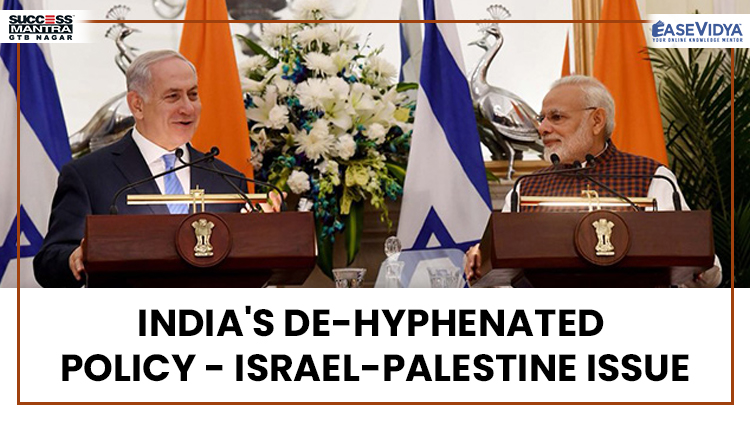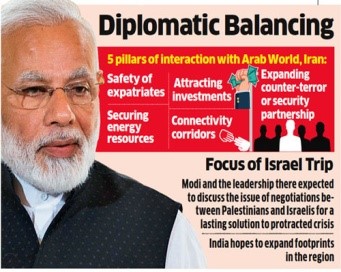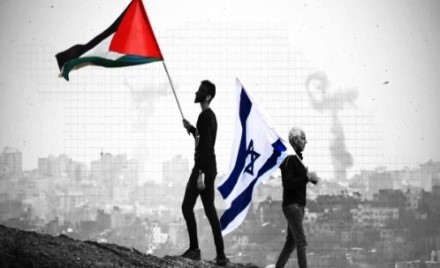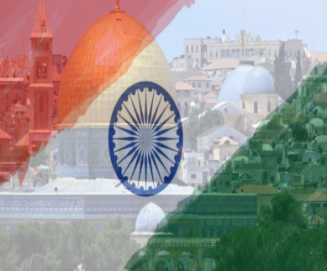
INDIA'S DE-HYPHENATED POLICY ISRAEL-PALESTINE ISSUE
INDIA'S DE-HYPHENATED POLICY - ISRAEL-PALESTINE ISSUE
Recently, on the sidelines of the COP26 summit in Glasgow, the Prime Minister of Palestine called for India’s support to play a stabilising role in West Asia by maintaining cooperation with all related parties. This statement is significant in the context of India’s External Affairs Minister visit to Israel, whereby he excluded a trip to the Palestinian territory. India in the recent year has been following a dehyphenation policy between Israel and Palestine.

Current Affairs Notes By Success Mantra Coaching Institute GTB Nagar Delhi CLICK HERE
INDIA'S POLICY TOWARDS ISRAEL AND PALESTINE
The Israeli-Palestinian conflict dates back to the end of the nineteenth century. It is linked to the age-old tussle over identity and land starting with Jerusalem. In 1947, the United Nations (UN) adopted Resolution 181, known as the Partition Plan, which sought to divide the British Mandate of Palestine into Arab and Jewish states. This led to unresolved conflict between Israel and Palestine. Traditionally, India’s foreign policy towards Israel and Palestine has been a hyphenated foreign policy. However, hyphenating the ties with Israel – linking them to ties with the Palestinian Authority – essentially prevented India from pursuing a pragmatic policy of what was in India’s best interests. In recent times, India is being seen shifted towards a Dehyphenation of Policy.
DEHYPHENATION OF POLICY
India’s policy on the longest running conflict in the world has gone from being unequivocally pro-Palestine for the first four decades, to a tense balancing act with its three-decade-old friendly ties with Israel. In recent years, India’s position has also been perceived as pro-Israel. In 2017, in an unprecedented move, India’s PM visited only Israel and not Palestine. Then, the recent visit of the Prime Minister to Palestine, Oman and the UAE is again a continuation of similar policy. This departure from earlier policy and endorsing an independent policy towards these two rivals is called the de-hyphenation in India’s foreign policy. It means India’s relationship with Israel would stand on its own merits, independent and separate from India’s relationship with the Palestinians.
The de-hypenhation is actually a careful balancing act, with India shifting from one side to another as the situation demands. As India moves towards becoming a larger player in global politics and economics, these pre-existing policies are increasingly in need of review, and de-hyphenating Israel and Palestine was a process long past its due date. In recent years, India has broken the tradition of supporting Palestine at the UN. In 2019, India voted in favour of Israel at the ECOSOC (Economic and Social Council) to deny observer status to a Palestinian organisation named Shahed. Further, India abstained during the voting on a resolution calling for investigation into Israeli actions in the Gaza Strip at the Human Rights Council.
PALESTINE CALL FOR INDIA
India had a historic tradition of supporting the rights of the Palestinian people. Palestine wants India's technical support to be “parallel to the political support”. It wants India to reaffirm supporting the Palestinian people’s right to self-determination and the establishment of an independent State of Palestine, with Jerusalem as its capital.
ISRAEL - PALESTINE CONFLICT
It is linked to the age-old tussle over identity and land starting with Jerusalem. In the first Arab Israel war of 1948, the Israelis captured the western half of the city, and Jordan took the eastern part which Israel later captured and annexed. Since then, Israel has expanded settlements in East Jerusalem. The Palestinians want to make East Jerusalem the capital of their yet to be formed state. Israel sees the whole city as its “unified, eternal capital”, whereas the Palestinian leadership denies for any compromise unless East Jerusalem is recognised as the capital of future Palestinian state. The Palestinians are facing the threat of eviction from Sheikh Jarrah, a neighbourhood in east Jerusalem. Their land is to be given to the Jewish settlers. Moreover, the Israeli armed forces have recently attacked the Al-Aqsa Mosque ahead of a march by Zionist nationalists. The Al Aqsa Mosque is the third holiest shrine for Islam after Mecca and Medina.

It created a fear for the followers, all over the region and the radicals began to call for defending the Al Aqsa Mosque. Also, earlier this year (2021), the Central Court in East Jerusalem upheld a decision to evict four Palestinian families from their homes in Sheikh Jarrah in favor of Jewish settlers. The issue remains unresolved and potentially inflammable. The current outbreak of violence is the most severe one since 2014 involving the rocket-firing by the Palestinians and the air-strikes conducted by Israelis in retaliation.
FACTORS TRIGGERING THE CONFLICT
- Hamas in Rule in Palestine: Hamas, found in 1987, is a violent offshoot of Egypt's Muslim Brotherhood seeking "to raise the banner of Allah over every inch of Palestine" through violent jihad. The Palestinian President is quite old age and hence, senile and unable to fight for the cause. So, Hamas is the more radical faction of the Palestinians which has now started retaliating. The so-called president authority of Palestine is neither conducting elections, nor functioning properly, the dictatorship of the Hamas and Israeli seizure of territories and limitations is aggravating the Palestinians.
- Political Instability in Both the States: There is incapability and stagnation in the leadership structures on the both sides thus leading to too many groups getting out of control, who are resorting to maximum violence. Moreover, Israel has had 4 elections in the last two years and all of them were inconclusive. The Prime Minister of Israel has retained his post but only in a caretaker form.
- Divided Israel: The Israelis are all highly divided. The Arabian Israelis who are just 20% of the population, identify with the Palestinians due to the same ethnicity. The Arabian Israelis and the far-right community of Israel are engaging in civil war like activities inside the country.
- Issues with the Palestinian People: The ground sentiments of the Palestinians are also changing, the majority of them saying they do not want a two state solution. It is also not decided if Hamas will rule over the Palestinian state or the Fatah or neither of these. The Palestinians have been a divide lot between between the Hamas and the Fatah and the two are moving on the different tracks which is the main reason for the defeat of the ultimate Palestinian cause. United Palestine with the help from the Arab world and the other countries could have achieved much more than it is achieving now. They are geographically separated by Israeli territory so it is not a viable state anymore, plus, the land going into the Jewish hands is further aggravating the Palestinians.
- The US losing its Significance in the Region: The US is preventing the meeting from taking place at the UNSC for Palestinian cause and completely recognises the rights of Israelis to defend themselves. The US President recognising Jerusalem as Israel’s de facto capital also became a major problem. The US, under President Joe Biden, does not have much leverage on Israel, unlike the US under Donald Trump who clearly supported Israel. They are trying to be more even handed. Although the current administration in the US has talked about being neutral, it hasn’t invested much diplomatic energy in this conflict.

CONCLUSION
India’s role in multilateral organisations requires “strenuous efforts in cooperation with all related parties to achieve security and stability in the Middle East and West Asia”. India is currently serving as a non-permanent member of the United Nations Security Council for 2021-22 and was re-elected to the Human Rights Council for the 2022-24. India should use these multilateral forums to act as a mediator to resolve the Israel-Palestine issue.
Current Affairs Notes By Success Mantra Coaching Institute GTB Nagar Delhi CLICK HERE
TEST YOURSELF
Q.1 Recently, on the sidelines of the COP26 summit, India has indicated towards the adoption of 'De-hyphenation policy' to which of the following two countries?
- Bahrain & Palestine
- Israel & Palestine: ANSWER
- United Arab Emirates & Israel
- None of the following
Q.2 Recently, which of the following mosques was attacked by the Israeli forces situated in Haram esh-Sharif in Jerusalem?
- Al-Aqsa Mosque: ANSWER
- Sheikh Zayed Grand Mosque
- Masjid Al-haram
- None of the above
Q.3 Which of the following given statements is/are incorrect in the reference to the Sheikh Jarrah Issue between Israel & Palestine?
- Hundreds of thousands of Palestinians were forced out of their homes when the State of Israel was created in historical Palestine in 1948.
- Sheikh Jarrah is a place near East Jerusalem which was earlier ruled by Jordan & later captured by Palestinian forces.
- Only I follows
- Only II follows: ANSWER
- Both I & II follows
- None of the above
Q.4 Consider the following statements and state which of the following is/are incorrect in the reference to the Abraham Accord brokered by the USA?
- The Abraham Accords also open the door for Muslims around the world to visit the historic sites in Israel and to peacefully pray at Al-Aqsa Mosque in Jerusalem, the third holiest site in Islam.
- Bringing Israel, Saudi Arabia & Bahrain together through the accord reflects their shared concern about Iraq's rising influence in the region and development of ballistic missiles.
- Only I follows
- Only II follows: ANSWER
- Both I and II are correct
- None of the above
Q.5 Consider the following statements & state which of the following is/are incorrect in the context of the history of Israel & Palestine conflict?
- In Six-day Arab- Israeli war, Israeli forces seize the Golan Heights from Syria, the West Bank & East Jerusalem from Jordan and Sinai Peninsula & Gaza strip from Egypt.
- Under the Stockholm Accords Israel and the PLO agree to officially recognize each other and renounce the use of violence: ANSWER
- Hamas is regarded as a terrorist organization by the U.S. government & In 2006, Hamas won the Palestinian Authority's legislative elections.
- None of the above













0 Comment